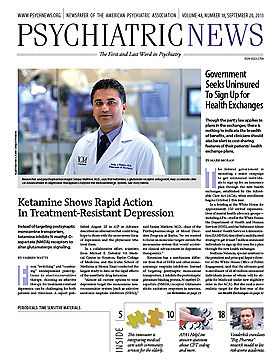No Genetic Link Found For Alzheimer’s Disease And Parkinson’s Disease
For years, scientists have speculated that there may be a genetic association between Alzheimer’s disease (AD) and Parkinson’s disease (PD). According to a study in JAMA Neurology, evidence does not seem to back this theory.
Researchers at Cardiff University School of Medicine in the United Kingdom examined the genetic overlap of the neurodegenerative diseases by performing a combined genomewide association analysis in more than 3,000 patients with AD and 5,000 patients with PD. The study showed no evidence of gene overlap on any chromosome that would increase the risk of both PD and AD.
The study authors concluded that “our findings therefore imply that loci that increase the risk of both Parkinson’s and Alzheimer’s are not widespread and that the pathological overlap could instead be ‘downstream’ of the primary susceptibility genes that increase the risk of each disease.”
Oprah and Einstein May Help Detect Dementia
A report in Neurology suggests that faces such as those of Albert Einstein, John Kennedy, and Oprah Winfrey may help identify early dementia in individuals aged 40 to 65.
The study, led by researchers at the Cognitive Neurology and Alzheimer’s Disease Center at Northwestern University, consisted of a face-recognition test of 20 famous people that was administered to individuals with early-onset dementia and to people without dementia. The participants were awarded points for faces they could name or identify through a description. The participants also underwent MRI brain scans to evaluate tissue damage.
The results showed that those with early-onset dementia scored significantly worse—with an average of 79 percent in face recognition and 49 percent in naming the faces—than did those who were free of dementia. The latter group scored 97 percent on face recognition and 93 percent on naming. Among those with early-onset dementia, the MRI scan showed that people who score low on naming were more likely to have loss of tissue in the left temporal lobe, while those who lacked the ability to recognize faces had tissue loss in both lobes. The study concluded that the distinction between one’s ability to recognize a face and actually naming it can help identify an individual’s specific cognitive impairment.
Employment Gaps Can Predict Late-Life Cognitive Function
Researchers from the University of Luxembourg reported in the Annals of Epidemiology that certain activities performed during extended periods away from work are associated with later cognitive function and change.
More than 18,000 retired Europeans who experienced employment gaps of six months or more during their work life were evaluated for cognitive dysfunction as assessed by immediate recall, verbal fluency, and orientation tests.
The results showed that those with employment gaps due to unemployment and sickness were at highest risk for late-life cognitive impairment, whereas those with employment gaps for maternity leave or time tending to family were at lowest risk for cognitive decline.
“There may be different mechanisms at work, for instance maternity spells may reduce the stress of balancing family and work tasks,” said lead author Anja Leist, Ph.D. “The [current] findings are in line with other studies that suggest that cognitively stimulating activities can indeed increase cognitive reserve and delay cognitive decline in older age.”
Raising Grandchildren Can Raise Grandparents’ Depression Risk
Keeping grandchildren 24 hours every day can increase risk for depression in grandmothers, according to a study published in Nursing Outlook.
Carol Musil, Ph.D, R.N., a professor of nursing at Case Western Reserve University, led a seven-year study comparing depressive symptoms in grandmothers who served as full-time caregivers of their grandchildren with grandmothers who weren’t full-time caregivers for their grandchildren. The participants, who were from rural, urban, and suburban backgrounds, were also evaluated on factors of intrafamily strain and resourcefulness.
The data showed that grandmothers who served as full-time caregivers had a significantly higher incidence of depressive symptoms and intrafamily strain than their counterparts who did not raise their grandchildren. Grandmothers who raised their grandchildren indicated that they were not opposed to receiving various forms of help.
The researchers noted that women who raise their grandchildren might be open to resourcefulness training, which could help reduce depressive symptoms. “They need support from others,” said Musil, “but the most important thing is to maintain and perhaps develop new cognitive and behavioral skills and approaches for handling some very challenging family issues.”
Allergy and Asthma May Contribute to ADHD Onset
Researchers in the Department of Pharmacy at the University of Groningen in the Netherlands evaluated 4,420 young boys with and without attention-deficit/hyperactivity disorder (ADHD) to determine whether there was an association between ADHD diagnosis and a history of asthma and allergic disorders.
Published in the Annals of Allergy, Asthma, and Immunology (AAAI), the results showed that among children with ADHD, 34 percent had asthma and 35 percent had an allergic disorder.
“Our study provides additional evidence to support the hypothesis that atopic disorders, such as asthma and food allergies, increase the risk of developing ADHD,” the authors wrote.
Gailen Marshall, M.D, editor in chief of AAAI said that “further research is needed to understand why there appears to be an increased risk of developing ADHD in children with allergy and asthma.”
Hak, de Vries T, Hoekstra P, et al. “Association of Childhood Attention-Deficit/Hyperactivity Disorder With Atopic Diseases and Skin Infections? A Matched Case-Control Study Using the General Practice Research Database.” 2013. Ann Allergy Asthma Immunol. 111(2):102-6.
http://www.annallergy.org/article/S1081-1206(13)00357-8/abstract.
Night Shifts Associated With Anxiety and Depression
Does working overnight increase a person’s risk of developing an anxiety or depressive disorder? A study in PloS One investigated the association between night work and mental illness onset by evaluating psychiatric, insomnia, and fatigue symptoms of more than 2,000 Norwegian nurses who had worked night shifts or did not do so during the prior 12 months.
The data showed that nurses with current or previous overnight schedules reported more insomnia and fatigue than those who never worked overnight. Anxiety and depression, which were assessed by the Hospital Anxiety and Depression Scale, were not associated with night work.
The researchers did note limitations that point to the need for further research. For example, “All participants of the present study were nurses, restricting the range of both socioeconomic status and work content. Thus, generalization to the general [overnight] shift work population might be limited….” ■

